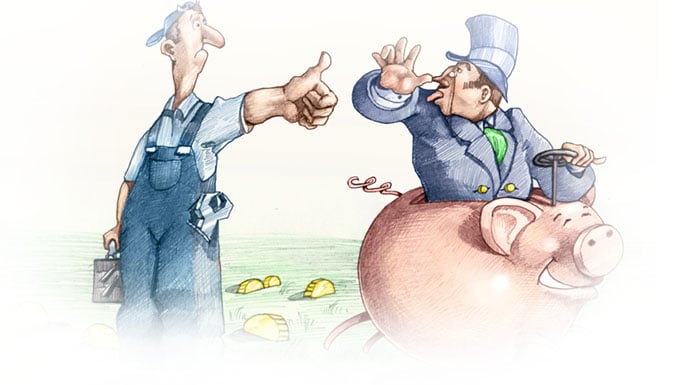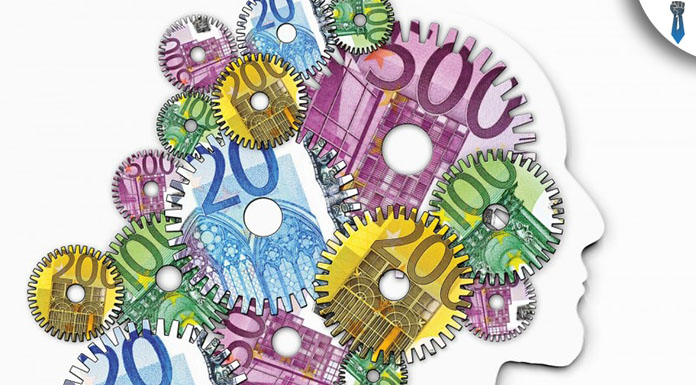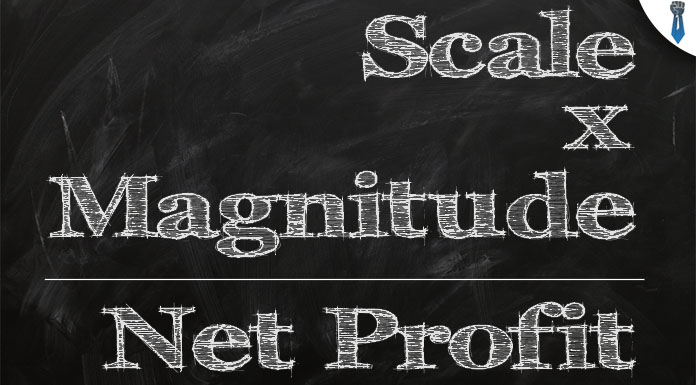A few days ago, I went over to a local coffee shop in my neighborhood. It’s a cute little place owned by a few young lads. One of them Dimitris is a pretty smart guy actually, and quite often we talk a bit about general issues.
Last time I was there, the conversation revolved around capitalism.
You see, when I asked Dimitris about what his definition of capitalism is, he said something like: “It’s the system where all the rich people take advantage of poor people. They pay them pennies, while they sit behind their enormous desks and they let all these poor people do the hard work.”
Unfortunately, most people (Dimitris included) have a completely skewed perception of what capitalism is. I tried to explain in simple terms, but I failed – miserably. So today, I want to take another shot and try to explain in even simpler terms, what capitalism is and why I’m a big fan of it.
A tale of two countries
Once upon a time, there was a small country called Poorville. The country was running smoothly; the wise king was in control of everything, transportation, land, oil, industry, etc.
There was no private sector and all citizens were “equal”. Since there was low to none private ownership, the standard of living for the majority of the population was almost the same.
People were not very poor nor very rich. If they wanted to buy a horse to travel, they would go to the king. If they wanted the oil to light their lamps, they would do the same. Virtually for everything, they would have to buy it directly from the king. Everything else was forbidden.
Since the ownership and trading of everything was the king’s job, there was no competition at all. Because of that, the king was the one to say how much each thing would cost, and usually, the variety was very limited. They had one type of metal, one type of milk, one type of flour, one type of oil, one type of education, etc.
Since the king was essentially the single seller for everything in this country, he didn’t care about finding the best pricing, the best quality or the best opportunity for every commodity.
He was the only one who could sell things, so whether people liked this ice cream or not, whether they thought it was expensive or not, they had no other choice.
A few thousand miles away, there was this another country, Capitaland. Things there were entirely different. Although they had a king as well, he was absolutely in no control of ownership and trading at all. He was in control of some public sectors, as the legal system of the country, but his power over the buying and selling of almost everything was very limited.
Contrary to Poorville, here in Capitaland, ownership of capital goods was a matter of the private sector.
Individuals owned all capital assets like factories, transportation, commodities, electricity distribution, mail systems, education, etc. But because this was a free economy, all individuals, could compete with each other in every sector they wanted.
So if two people wanted to be in the horse selling business, they could do it. The one who would provide the more value (best quality, lowest prices, the highest level of customer support), would eventually kick his competitor to the curb.
Because of that, people of Capitaland could be either poor or very poor, middle class, rich or even filthy rich.
Capitalism
noun | cap·i·tal·ism | ˈka-pə-tə-ˌliz-əm
Capitalism: an economic system characterized by private or corporate ownership of capital goods, by investments that are determined by private decision, and by prices, production, and the distribution of goods that are determined mainly by competition in a free market.
Capitalism derives from the word “capital.” Again from Merriam-Webster.
Capital: accumulated goods devoted to the production of other goods or accumulated possessions calculated to bring in income.
What? What the hell are you talking about? No rich people taking advantage of their poor fellow countrymen?
Well…no, not really. But to be completely honest, it depends, on your perspective – more on that a bit later.
As you can see, from the definition of both words, in essence, capitalism is the economic system under which, individuals try to accumulate capital, that’s money devoted to the production of other goods and services to produce more money.
One of my favorite entrepreneurs, Patrick Bet-David gave an excellent example on one of his videos the other day.
I gave the same example to my dear friend Dimitris by rephrasing Patrick’s words a bit.
So I asked him if he could make his delicious coffee without his coffee machine? He said of course not. Then I asked him if he could bake his aromatic cookies without his mini-oven. Again, no he said.
You see, I told him, all these things you use in your shop: the coffee, the milk, the flour, the chairs, the tables, the lights, everything actually, was sold to you by some capitalists.
All these capitalists, use their money, to produce products or services to sell to you and me. By selling these products, they make profits to be able to live their lives, buy stuff for themselves, and invest in their business to regenerate more revenue and profits.
Depending on their individual standards, some of them will stop at level 1, others at level 5, 10, etc.
Yeah, but at what cost comes all this, he said?
I asked what do you mean?
All these capitalists, take advantage of the weak to build their products, he said. They pay them a few hundred bucks per month, and they have them work for 10 hours a day.
Then I asked; Were all these workers threatened with a gun to work for him? Did he say to them, work for me, or I’ll shoot you in the head?
I guess not, he told me.
There you have it then.
Like I said before, everything in life is about taking responsibility. Due to various reasons, which are way off the scope of this post, all these capitalists, have chosen a different life path from their workers.
All these entrepreneurs, have taken the route of production instead of consumption. They have risked their money, their sleep, their youth maybe and much more to build a company who would provide value to other people in exchange for money.
All these capitalists saw a need and a problem in their society, and instead of wasting their money on partying every Saturday night, they used it as capital.
Instead of spending it in liabilities they can’t afford, like cars, iPhones, and other luxuries, they used it to buy assets such as inventory, to buy marketing, to consult experts, to invest in themselves first, which brought them to the point where they are today.
All these business decisions brought these entrepreneurs to the point where they can hire some other people for $10 per hour, while they make thousands or millions of dollars for themselves.
So is capitalism good or bad?
Well to be completely and utterly honest it depends.
It depends on where you stand and what your ambitions are.
If your goal in life is to be average, to work for pennies, to pray each night not to get your pension cut in half, and to feel okay because you can correlate with other mediocre people, then you should choose Poorville to live.
This is a perfect economic system for people who don’t want to put the extra effort it takes to create greatness. They won’t feel poor because they won’t really be poor, they’ll just be average.
On the other hand, if you think like me, if you would love competition and cooperation, if you love hustling like hell to achieve things, if you dream of becoming larger than life, if your ambitions are going through the roof, then Capitaland is the place for you.
No exceptions.
Again, quoting PBD who said:
Capitalism is a perfect economic system because it’s 100% fair.
And he’s totally right.
Capitalism is fair because it works with the same principles nature does.
The most fundamental law of nature is that, the one who offers the most value wins.
Let me repeat that.
In nature, he who brings the most value to the others wins.
[bctt tweet=”In nature, he who brings the most value to the others wins.” username=”projectbebest”]
If I offer 5 units of value (whatever that value is) and you offer 3 units of value you lose.
Sorry, it’s all about math. Can’t cheat nature.
How much money you make?
Have you ever thought of how much money you make?
$1,000, $5,000, $100,000 or even $1,000,000?
Have you ever thought what your income represents? What your income stands for?
So let me tell you. It’s actually a very simple formula.
Your Income = The Value You Bring to the Society
That’s right folks. If you’re my old friend Joe who flips burgers for $500/mo, this is another way for the society to tell you that the value you bring here dude equals to $500/mo.
On the other hand, if you’re Oprah, you make around $23 millions per month, because society thinks you bring so much value to the game.
By the way, here’s a helpful tool that can tell you a few nice things about your hourly rate.
Don’t try to think in your selfish terms here. In a romantic way, a coal miner or a burger flipper are doing a harder and more dangerous job than Christiano Ronaldo who kicks a leather ball.
But in real life, the skill of the coal miner can be bought cheaply, because it requires a low level of expertise. On the other hand, being Ronaldo requires…well, a lot more…
Parting piece of guidance
Whether you like it or not, capitalism is the dominant economic system at least in western civilization.
In my opinion, it’s 100% fair because it fully aligns with mother nature. It’s purely mathematical, and that makes the outcome almost predictable.
If I bring more value to society than you do, I win. As simple as that. There’s no place for romanticism here. No matter how much you think you worth, the only deciding factor that matters is what the market says.
Capitalism is the only economic system, where you have the potential of becoming a superstar. If you’re 100% determined, if you have a solid plan, and if you put the hard work, results are almost guaranteed.
Here’s my simple 5-step plan to thrive in Capitaland:
- Become an expert in your field of interest. For example, I try to do so in Kindle Publishing.
- Then create a sales process and exchange your value (not time) for money.
- Reinvest most of your profits (capital) back to your business to generate more sales.
- Improve your process where needed. Make it as efficient as possible.
- Rinse and repeat until you’re financially free.
Embrace capitalism. Move your a$$ to Capitaland and make excellence.


